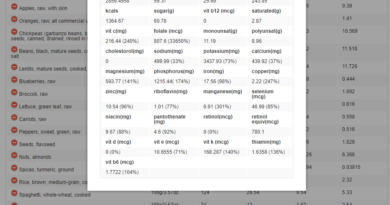10 Things you should know about losing weight
One of my Facebook Fans mentioned this programme, so I have posted my notes from the BBC programme for others who may be interested (quotation marks indicate direct quotes from the programme – verbatim):
RED = tips trying to get the presenter/researcher to eat less.
Blue = trying to curb hunger (to get him to eat less)
Green = Trying to get him to do more/use calories in some way.
Intro:
“Losing weight continues to be one of the hardest things we ever attempt. Each year millions of us try to slim down and fail.”
Researcher = Michael Mosley (weighs 13.5 – 5lbs more than he wants)
TIP 1 = Don’t skip meals – MRI brain scan showed when the researcher had skipped breakfast he had a proven desire for higher calorie foods than when shown the same foods after breakfast.
TIP 2 = Swap a 12” plate to 10” and you’re likely to eat up to 22% less food. E.g. the popcorn study showed that the volunteers with the large tubs ate more than the volunteers with the smaller tubs. The more there, the more the people ate.
TIP 3 = Count your calories. MM was asked to guess the calories in the following:
– a fruit salad (he guessed 100)
– a smoothie (he guessed 200)
– a pork pie, a sandwich and some chocolate (he guessed 300 for all of these)
– a muffin (he guessed 350)
– a full chicken dinner with veg (he guessed 400)
In fact all of the dishes had 300 calories.
“By choosing low calorie versions of all your favourite foods, you could halve your calorie intake every day.” (Zoe – yes – and the body will do whatever it can to make up the deficit! Plus, direct and indirect things happen when you make low calorie/low fat food choices and it’s the worst thing you can do).
TIP 4 = Don’t blame your metabolism.
Do some people just have a slow metabolism? Debbie Chazen (I sent her a book and she very kindly replied!). She eats well, exercises and can’t lose weight – been big all her life. She concludes it’s her metabolism. She had her metabolic rate tested and it was bang on normal. She agreed to keep a food diary for 9 days. The first 4 days with a video camera at the end of the day and the next 5 days with a food diary after each meal. Goal was to see if Debbie was eating more than the recommended 2000 cals a day for a woman of her age and height. She also drank the spy water to see how many calories Debbie ate and burned. Video diary revealed she thought she had eaten 1100 cals, the clever water recorded 3000 cals a day. Even with the written diary Debbie forgot to record 43% of the food she had eaten.
“Statistics for the general population show that we all under report by as much as 50%.”
(Zoe observation – look at the carbs she eats – Debbie has a massive fruit salad each morning).
“At any one time in Britain, around 10 million people are trying to lose weight and most of them fail. Usually because they just can’t stick to the diets.” (Zoe note – because hunger is one of the most powerful human drivers! We need to eat better, not less).
TIP 5 = Protein staves off hunger pangs (“but do keep counting your calories”)!
What kinds of foods will keep you feeling fuller for longer? Clever ways in which you can fool your brain. Scientists have known for some time that protein makes us feel fuller but, until recently, no one had really understood why.
Experiment – breakfasts prepared with same number of calories. Mick has carb rich breakfast (10% more carbs). Willie has 10% more fat. Charlie has 10% more protein. The 3 men are asked to rate how hungry they feel every hour on the hour. After 4 hrs, the results confirm Charlie felt fuller for longer and research shows that Charlie is also more likely to eat less at lunch.
Q) Why does protein make us feel fuller?
A) When any food travels into the digestive system it triggers the release of a hormone called PYY and when PYY reaches the brain it suppresses hunger pangs. Scientists have now discovered that protein triggers far more PYY than any other food – suppressing hunger for longer.
MM – “When I was at medical school we were taught that calories were calories and that the only way to lose weight was to eat less of them.” “The evidence is now almost overwhelming that protein is switching off your urge to eat.” (Zoe note – the Jequier, Fine and Feinman work 2001-2004 shows that thermogenesis – the way the body handles different macronutrients – is very different for fat/protein and carb/protein).
TIP 6 = Soup keeps you feeling fuller for longer.
Two teams from the army – yellow team chicken/rice/veg dinner and a glass of water. The other team (red) had the same dinner liquidised with the water to make a soup. Used an ultrasound to see what was happening in the stomach. Yellow team had empty tummies after 2 hrs, soup was still there up to 4 hrs. The rationale was that the water passed through quickly when drunk alone and yet stayed in the stomach when mixed with the food. This is why the red team showed more volume in the stomach for longer. The blended mass couldn’t drain as quickly.
TIP 7 = The wider the choice, the more you eat
How evolution has affected our appetite. “The thing we can’t resist is choice.” V simple experiment with free sweets – one bowl multi-coloured and the other one purple only. (Z – could also have been that we don’t eat many purple things!) You are likely to eat 30% more at a buffet than when given a set meal.
Tip 8 = Low fat dairy helps you excrete more fat.
Milk, cheese, butter, yoghurt are usually the first things to give up on a diet because of their fat content. Recent research shows that the calcium in dairy products binds to fat molecules in the small intestine and forms a soap like substance so that the fat molecules are excreted (like Alli!) … Alex from Blur did a dairy test. 1st week Alex eats a diet low in dairy, 2nd week a diet high in dairy (and therefore diary calcium). Same number of calories and same fat content in both diets – the only big difference is the dairy calcium. Poo analysed in Holland! Week 1 he ‘poo’d’ 5.1g of fat in 24 hours. Week 2 he poo’d 10.4g of fat in 24 hours. The programme extrapolated this to say it would amount to 2kg more fat over one year.
TIP 9 = Exercise goes on burning fat even while you sleep.
What about exercise? New research about burning fat while asleep. Is exercise a good way about losing weight? MM walks at 4 miles an hour for the test (90 mins of exercise). He burned 161 cals! 19 g worth of fat! (About a bag of crisps!) In an hour and a half of exercise he has only burned 161 cals. “The results could change everyone’s view of exercise for ever.” Yesterday you burned 19 g of fat during your exercise, today it’s 49g.” Overnight, while sleeping, ‘after burn’ burns more fat. MM “That is a complete revelation.”
Why? When we exercise we use mostly carbs for energy. Once the carbs have gone, after exercise, it takes another 22 hrs for these to be replaced and the body has to burn fat during this time. (Z – this ignores the food that goes in during the next 22 hrs?!)
TIP 10 = Keep moving and lose weight (you don’t need to join a gym to burn off more calories, but don’t eat more)
Amy le May – Radio presenter – does this test. Amy has stopped smoking and lost c. 4 stone. She needs to lose more. She is wired up to see if small changes during the day can add up. Typical day is not very active. Day 2 Amy has to be a little more active – use the stairs, move around on the phone, get on at a later tube stop, walk on the escalator, walk around at lunchtime etc. Day 2 Amy burned 240 more calories.
Presenter: “If she were to keep up her increased activity for a 1 year she could lose up to 12kg, that’s just under 2 stone.” (Zoe – no she wouldn’t! That’s the calorie formula nonsense again. She would very quickly get hungry, as her body registered the deficit and tried to get her to eat more).
The presenter lost 5kg in 4 mths. (Not sure many people would be happy with that rate of weight loss!)



So how can you lose weight?
Hi Edwin
Don’t eat less – eat better. Only real food (meat, fish, eggs, non-starchy veg should be the base of any diet). Dairy/fruit in season/starchier veg/non-wheat grains are fine for many people as part of a real food/weight loss plan. For others, they are too high in carb for successful weight loss.
This is a quick video on The Harcombe Diet https://www.youtube.com/watch?v=9ALXmgwqjC8
This is a longer one (lecture in Cardiff) about weight and things we’ve got wrong https://www.youtube.com/watch?v=SB-69xA6ics
This is c. 10 mins on the difference between eating less vs eating better http://www.theobesityepidemic.org/2014/02/a-calorie-is-not-a-calorie-and-heres-the-reason-why/
Hope this helps
Best wishes – Zoe
Hello,
I wiould like to understand why Michael advised not to skip meals in his original program on dieting a couple of years ago as outlined above and yet in his recent research – now says that you need to go throughout the day after breakfast without eating until dinner to lose weight. This seems to be contradicting each other – or has new research made him change his mind.
I am also not overly happy about not eating regularly as I get reflux and therefore a build up of acid if I don’t eat every 2 to 3 hours. Is it the case that the 5:2 diet just wouldn’t be suitable for someone like myself?
I have followed Michael’s programmes on dieting and exercise for years now so would be very interested in his views or your opinion.
Kind regards
Kim
Hi Kim
Good spot! May 2009 – don’t skip meals; Aug 2012 – fast! (https://www.zoeharcombe.com/the-knowledge/intermittent-fasting-the-facts/)
I’m not the right person to ask – Michael is quite responsive on twitter if you do twitter and want to ask him. As you suggest – new research may have changed his mind – good researchers do change their mind as they discover new things. I’m also not the best person to ask about the 5:2 generally – it seems like hell on earth to me. I eat what I want/need every day but stay the weight I want to be ‘cos I don’t eat processed food (except dark choc). I could never eat c. 500 cals a day for 1 day – let alone 2 days a week :-(
In theory – you could do this – assuming you’re awake 16 hours on the fast days, you could eat 6-8 times with c. 60-80 cals (6*80 or 8*60) each time. That would not be tolerable in my book.
Hope this helps
Best wishes – Zoe